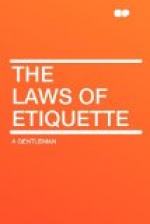Remember, that all deviations from prescribed forms, on common occasions, are vulgar; such as sending invitations, or replies, couched in some unusual forms of speech. Always adhere to the immemorial phrase,—“Mrs. X. requests the honour of Mr, Y.’s company,” and “Mr. Y. has the honour of accepting Mrs. X.’s polite invitation.” Never introduce persons with any outlandish or new-coined expressions; but perform the operation with mathematical precision—“Mr. A., Mr. A’; Mr. A’, Mr. A.”
When two gentlemen are walking with a lady in the street, they should not be both upon the same side of her, but one of them should walk upon the outside and the other upon the inside.
When you walk with a lady, even if the lady be young and unmarried, offer your arm to her. This is always done in France, and is practised in this country by the best bred persons. To be sure, this is done only to married women in France, because unmarried women never walk alone with gentlemen, but as in America the latter have the same freedom as the former, this custom should here be extended to them.
If you are walking with a woman who has your arm, and you cross the street, it is better not to disengage your arm, and go round upon the outside. Such effort evinces a palpable attention to form, and that is always to be avoided.
A woman should never take the arms of two men, one being upon either side; nor should a man carry a woman upon each arm. The latter of these iniquities is practised only in Ireland; the former perhaps in Kamskatcha. There are, to be sure, some cases in which it is necessary for the protection of the women, that they should both take his arm, as in coming home from a concert, or in passing, on any occasion, through a crowd.
When you receive company in your own house, you should never be much dressed. This is a circumstance of the first importance in good breeding.
A gentleman should never use perfumes; they are agreeable, however, upon ladies.
Avoid the use of proverbs in conversation, and all sorts of cant phrases. This error is, I believe, censured by Lord Chesterfield, and is one of the most offensively vulgar things which a person can commit. We have frequently been astonished to hear such a slang phrase as “the whole hog” used by persons who had pretensions to very superior standing. We would be disposed to apply to such an expression a criticism of Dr. Johnson’s, which rivals it in Coarseness: “It has not enough salt to keep it from stinking, enough wit to prevent its being offensive.” We do not wish to advocate any false refinement, or to encourage any cockney delicacy: but we may be decent without being affected. The stable language and raft humour of Crockett and Downing may do very well to amuse one in a morning paper, but it exhibits little wit and less good sense to adopt them in the drawing-room. This matter should be “reformed altogether.”




